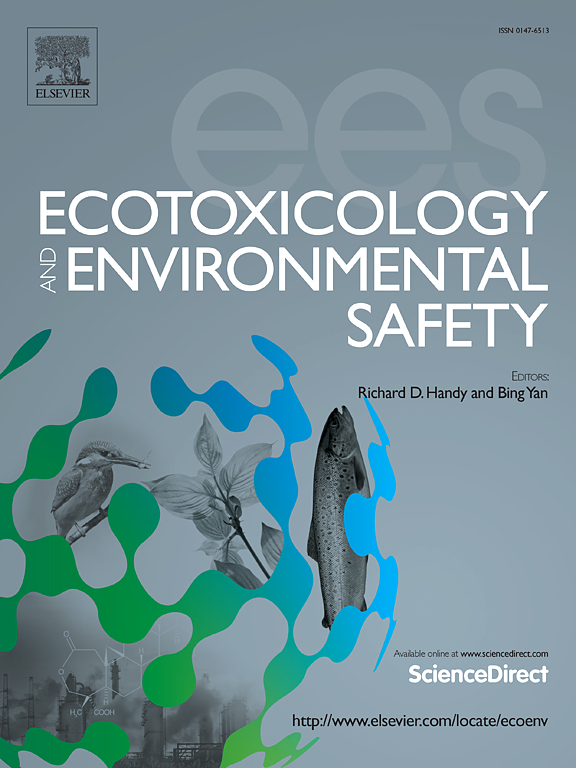GenX通过mTOR信号介导的自噬抑制诱导BV2小胶质细胞的神经炎症反应
IF 6.1
2区 环境科学与生态学
Q1 ENVIRONMENTAL SCIENCES
引用次数: 0
摘要
六氟环氧丙烷二聚酸(HFPO-DA),通常被称为GenX,可以穿过血脑屏障并渗入脑组织,导致神经系统损伤,主要表现为神经炎症和神经元凋亡。尽管存在这些日益增加的担忧,但很少有研究全面检查GenX暴露的分子神经毒性机制。在本研究中,我们检测了GenX在BV2小胶质细胞中诱导的神经炎症反应。我们的研究结果显示,GenX暴露抑制了BV2小胶质细胞的自噬。我们进一步证明,GenX暴露刺激了BV2小胶质细胞中的PI3K/AKT/mTOR信号通路。最重要的是,GenX暴露增强了BV2小胶质细胞中促炎细胞因子的表达。此外,我们发现雷帕霉素治疗作为mTOR抑制剂,通过恢复BV2小胶质细胞中被抑制的自噬,逆转了genx介导的促炎细胞因子的增强。总之,我们的研究结果表明,GenX通过PI3K/AKT/ mtor介导的自噬抑制来刺激促炎细胞因子的产生。因此,靶向治疗PI3K/AKT/mTOR通路可能是小胶质细胞介导的神经炎症的可行治疗策略。本文章由计算机程序翻译,如有差异,请以英文原文为准。
GenX induces neuroinflammatory responses in BV2 microglial cells through mTOR signaling-mediated inhibition of autophagy
Hexafluoropropylene oxide dimer acid (HFPO-DA), commonly known as GenX, can traverse the blood-brain barrier and infiltrate brain tissue, leading to nervous system damage that primarily manifests as neuroinflammation and neuronal apoptosis. Despite these mounting concerns, few studies have comprehensively examined the molecular neurotoxic mechanisms of GenX exposure. In the present study, we examined the neuroinflammatory responses induced by GenX in BV2 microglial cells. Our results revealed that GenX exposure suppressed autophagy in BV2 microglial cells. We further demonstrated that GenX exposure stimulated the PI3K/AKT/mTOR signaling pathway in BV2 microglial cells. Most significantly, GenX exposure enhanced the expression of pro-inflammatory cytokines in BV2 microglial cells. Additionally, we found that rapamycin treatment, which acts as an mTOR inhibitor, reversed the GenX-mediated enhancement of pro-inflammatory cytokines by restoring the inhibited autophagy in BV2 microglial cells. In summary, our findings demonstrate that GenX stimulates pro-inflammatory cytokine production through PI3K/AKT/mTOR-mediated suppression of autophagy. Consequently, therapeutic targeting of the PI3K/AKT/mTOR pathway may serve as a viable treatment strategy for microglia-mediated neuroinflammation.
求助全文
通过发布文献求助,成功后即可免费获取论文全文。
去求助
来源期刊
CiteScore
12.10
自引率
5.90%
发文量
1234
审稿时长
88 days
期刊介绍:
Ecotoxicology and Environmental Safety is a multi-disciplinary journal that focuses on understanding the exposure and effects of environmental contamination on organisms including human health. The scope of the journal covers three main themes. The topics within these themes, indicated below, include (but are not limited to) the following: Ecotoxicology、Environmental Chemistry、Environmental Safety etc.

 求助内容:
求助内容: 应助结果提醒方式:
应助结果提醒方式:


